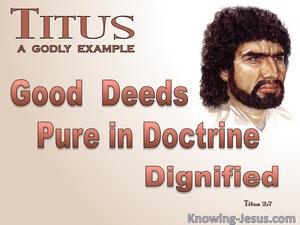◄ Titus 2 Devotional Commentary ►
Titus 2:1
Timothy was told to preach the word, in season and out of season. He was also instructed to reprove, rebuke, exhort and encourage the flock of Christ in two particular ways - 1) with all long-suffering and 2) with sound doctrine. And here we find Titus having the same instruction and being reminded of the critical importance of heathy teaching and sound doctrine.
Earlier in his epistle to Titus.. Paul described the qualifications, read more...
Titus 2:1
Both Timothy and Titus were young pastors who were exhorted to preach the Word, and were warned of the dangers of false teachers and unscriptural doctrines. Indeed, their speech, their actions, their attitudes, and even their motives were to accord to godliness and to reflect sound doctrine and wholesome teachings, both of which are firmly anchored to scriptural facts in the Word of God.
Paul was God's chosen vessel to expound read more...
Titus 2:3
Paul's life and ministry as God's chosen apostle to the Gentiles was drawing to its close, and yet when Paul wrote his letters to both Timothy and Titus, he recognised the increasing problem of false teachers and heretical dogma. Paul gave a stern warning that a time was coming when men and women would not endure sound doctrine.
Paul warned that many would profess to know the Lord and yet would deny Him by their ungodly works. read more...
Titus 2:4
Timothy was a young pastor to whom Paul passed on much valuable information about things which are fitting for sound teaching and wholesome doctrine. Not all doctrine covers issues of justification for the lost. Most of Paul's advice concerns righteous living for the saved and gives instruction on our interactions with fellow believers. Much of his teaching is linked with our progressive sanctification, maturing in the faith, and growing in grace.
read more...
Titus 2:5
Unlike the rest of Paul's writings, the two books of Timothy and the book of Titus were written to pastors, rather than an entire congregation. As well as offering encouragement to these younger men, the three epistles give instruction on how the Body of Christ should function and interact with one another, and also list the roles and responsibilities of Church leaders and those in their charge.
Having detailed the read more...
Titus 2:7
The apostle Paul sent a short epistle to Titus, who was a Greek convert to Christianity and had become a trusted fellow-bondservant of Christ. He not only accompanied Paul to the council of Jerusalem, which agreed that Gentiles do not have to become Jews nor do Jews have to become Gentiles, but he participated in ministry work in Corinth, Ephesus, and the little island of Crete.
Titus was a trusted minister of the gospel, and read more...
Titus 2:8
There are lessons on godly living for men and women of all ages in Paul's letter to Titus, and we would all be well-advised to take to heart his guidelines for those in positions of authority within the church: "Encourage the young men to be self-controlled in everything," he advises. "Make yourself an example of good works with integrity in doctrine. Be dignified in your teaching. Your message is to be sound in speech and beyond read more...
Titus 2:11
The grace of God is not a formula to be discovered through scientific means, nor is it a mechanism to be made, or a code of practice to be adopted. The grace of God is not an invention to be created out of man's intellectual skill, technological expertise, creative ability, or artistic imagination.
The grace of God appeared on earth in the Person of the Lord Jesus Christ, for He is the power of God and the wisdom of God, and read more...
Titus 2:12
There are godly rules and important instructions in the college of Christian living, which educate believers in sound doctrine, purity of heart, and saintly behaviour. As we journey through the ups and downs of life, we are called to implement these rules for living in each of our lives.
Older men and matrons, younger men and women, youths and elders, together with slaves and masters, all receive a range of biblical directives in read more...
Titus 2:13
We are living as aliens in a foreign land, for our citizenship is not of this world. We have been made co-heirs of the King of Glory by faith, and our home is in heaven. We are part of the new creation in Christ and are, "looking for that blessed hope, and glorious appearing of our great God and Saviour, the Lord Jesus Christ."
The Blessed Hope in this verse is referring to the Rapture of the Church, when Jesus read more...
Titus 2:14
Our salvation is nothing to do with what we DO but rests entirely upon what the Lord Jesus Christ has DONE. Our salvation has everything to do with Christ's merit and His finished work on the Cross and has nothing to do with our human merit or the good deeds we may do. Our salvation is a free gift of God's grace for all who simply believe on the Lord Jesus Christ, by grace through faith in Him. Our salvation rests of the finished work of Christ on the Cross of read more...
Titus 2:15
Paul gave some important teaching concerning the organisation and orderliness of the Church in Titus chapter 2, so that the Body of Christ would come to a knowledge of the truth, which leads to godliness. He explained that the Church should be a living testimony to the world, a living proof of the gospel of Christ and the goodness of God.
The godly lives and righteous behaviour of believers should set an example to the ungodly, read more...










